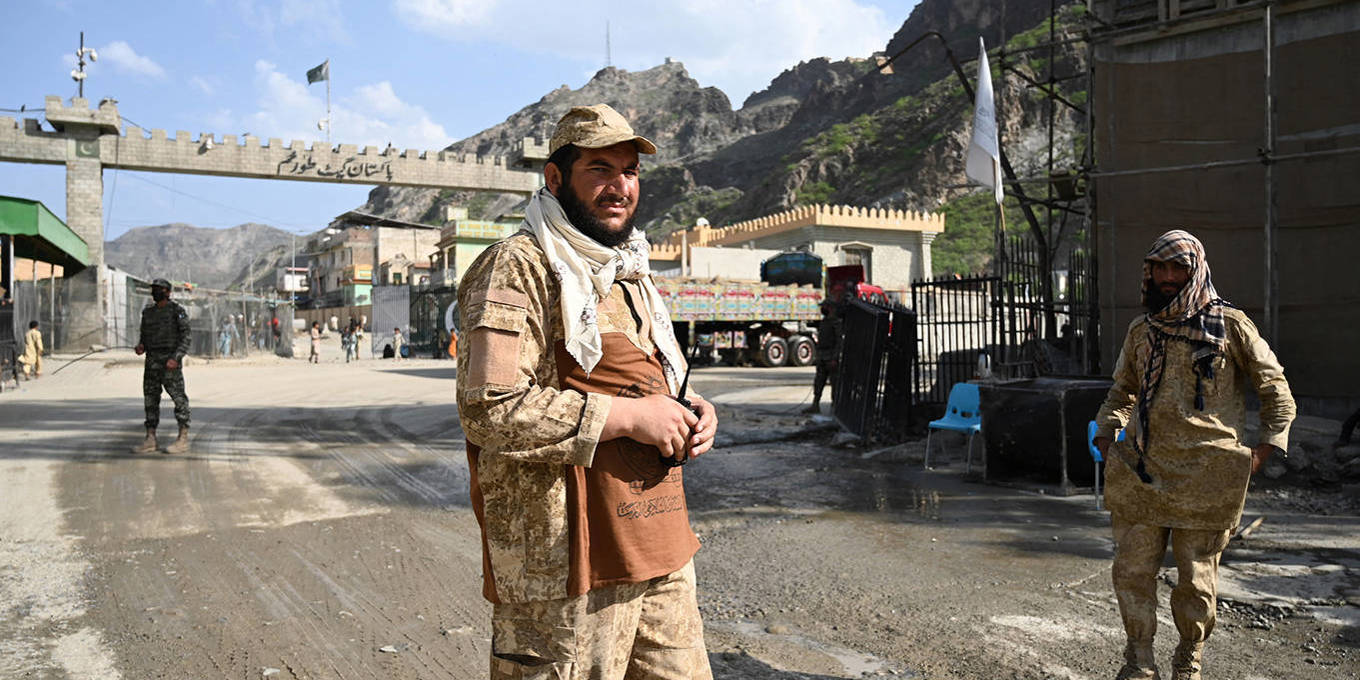Alwaght- The bombing of the Afghan capital Kabul and the ensuing intensive clashes on the Durand borderline bore witness to an unbelievable divorce of old political lovers.
The relations between Pakistan and the Taliban since 1990 and up to 2020 were based on shared strategic interests and interwoven security and intelligence networks. However, since 2022, their relation that was once warm and characterized by overt and covert cooperation gave place to distancing, border change, and trade of charges and even a strategic gap.
Alliance in coma
For decades, Pakistan spent its time and resources nurturing, harboring, arming, training, and financing the Taliban, seeing in it a proper instrument to hold a sway over Afghanistan and gain strategic depth against the rival India. But as Frankenstein found out, we cannot always rein in a monster we raise.
During the Taliban’s first rule over Afghanistan in the 1990s, Pakistan stood as one of the regime's few state sponsors. Its military and intelligence apparatus, including units within the powerful Inter-Services Intelligence (ISI), served as critical conduits, providing political backing and logistical support. This alliance was rooted in a "strategic depth" doctrine, for the goal of cultivating influence in Afghanistan to counter India and other rivals.
Even after NATO forces occupied the country, Pakistan continued its support. It supplied the Afghan Taliban and the Haqqani Network with logistical, military, and ideological backing throughout their insurgency against the US-backed Afghan government. This sustained patronage was a decisive factor in the Taliban’s triumphant return to power in 2021.
The cooperation often operated informally, relying on institutional contacts, financing for militant factions, and secure corridors for moving personnel and supplies. In return, Islamabad expected the Taliban, once in control, to rein in anti-Pakistan militant groups like the Tehreek-e-Taliban Pakistan (TTP), an implicit bargain between the two.
Pakistan initially celebrated the Taliban takeover as a victory, positioning itself as the winner of a long-term regional and international struggle for influence. But the jubilation was short-lived. The Islamic Emirate, it seemed, was not the same Taliban of old, and clouds of discord quickly overshadowed their relations.
The relationship faced its first major shock when the Taliban government did the unthinkable: it condemned a terrorist attack in the Indian-administered tourist area of Pahalgam in Jammu and Kashmir. In a statement offering condolences to the families of the 26 primarily Indian victims, the Taliban’s foreign ministry warned that such attacks threaten regional stability. The implicit message to Islamabad was crystal clear.
By the end of last year, ties had deteriorated so sharply that Pakistan’s special representative for Afghanistan, Muhammad Sadiq, flew to Kabul for crisis talks with senior Taliban leaders. Yet, even as he negotiated in the capital, Pakistani Air Force jets struck targets inside Afghanistan on December 24, killing 46 members of the TTP in Paktika province. The strike was retaliation for a TTP suicide bombing three days earlier that had killed 16 of its soldiers, Pakistan announced.
Since late 2023 and continuing into 2024-2025, their border has become a flashpoint. Repeated cross-border firefights, the closure of key trade routes like Torkham and Chaman, and trading accusations of aerial attacks have become commonplace. These escalating clashes reveal that tactical disagreements have spiraled into direct military confrontation.
Now the relations with Afghanistan have become a strategic swamp. It is so deep that under pressure from public, some parts of the Pakistani government have proposed to resort to the US for help, and even provide Washington with drone bases on the Pakistani soil to strike the anti-Pakistani militants hiding in Afghanistan.
Why has the alliance collapsed?
An array of simultaneous and cascading factors drove the relationship's rapid descent from close alliance to possible rivals :
TTP safe haven and activities
Pakistan has repeatedly accused the Taliban of providing safe havens or operational room to Pakistani militias, particularly the TTP. The repeated accusations and TTP attacks on Pakistani targets have been a primary reason for Islamabad's anger and the start of its military and diplomatic reactions. In response, Pakistan has utilized military options, including cross-border strikes and targeting suspected headquarters, triggering a new wave of hostility. The reality is that the Taliban's two-decade resistance against American military supremacy and their ultimate political and military victory has become a source of inspiration for the TTP. This group is now determined to do to Pakistan what its parent group did in Afghanistan: seize control of the government and establish another Islamic Emirate.
Amidst this, a shared fear of the expansion of ISIS, ISIS-Khorasan (ISIS-K), has also played a role in bringing the two groups closer.
Isus-K, which operates in Pakistan's northern tribal areas and several Afghan provinces, foremost among them Kunar Province, has increased its steady stream of anti-Taliban propaganda through its Al-Azim media foundation to undermine the Taliban government's credibility and religious authority.
ISIS-K specifically criticizes the Taliban's interactions with Western powers, arguing that the Taliban's actions are contrary to Islamic law. According to the propaganda of this terrorist group, the Taliban, after coming to power with American support, "has abandoned the global jihad against infidel regimes." The group also accuses the Islamic Emirate government in Kabul of acting as a pawn for foreign powers like the US, Russia, and China in exchange for international legitimacy and financial benefit, while ignoring the suffering of Muslims worldwide.
ISIS accuses the Taliban of following the "deeply flawed" Deobandi school of thought, labeling it an apostate "ethno-nationalist Pashtun-centric movement."
Given such enmity, the Taliban is naturally very worried about ISIS-K getting closer to the TTP and recruiting from its areas of operation if the TTP is weakened.
It is noteworthy that ISIS-K was born from disaffected members of the TTP and the Afghan Taliban. Until last year, ISIS-K's propaganda avoided taking oppositional stances against the TTP and avoided physical clashes and open hostility. This was to deprive their common enemy, the Pakistani security forces, of any strategic advantage, as both groups have apparently had tactical cooperation in their respective controlled areas within Pakistan.
TTP's main media outlet, Omar Media, has over the past two years stepped up its media production. The outlet publishes its material in Pashto, Urdo, English, and Dari and mainly promotes and adversarial and anti-government narrative, while to a large extent avoids openly blaming the ISIS or ISIS-K.
However, since mid-2025, ISIS-K's media output has begun publishing ideological rebuttals formally declaring the TTP to be apostates, a shift it attributes to the TTP's deep-rooted historical and organizational ties to the Afghan Taliban.
This ideological clash escalated publicly in late May 2024, when Qari Shuaib Bajouri, a senior ideologue and member of the TTP's leadership council, appeared in a video shared on X. In it, he denounced ISIS-K as a group comprised of "defectors from the TTP, Al-Qaeda, and the Afghan Taliban." He stressed that the TTP has no affiliation or agreement with ISIS-K but clarified that they are, nevertheless, not at war with them. Bajouri reiterated that the TTP's primary objective remains its jihad against the Pakistani state and consolidating control in Pakistan's tribal regions.
In a retaliatory response the following July, ISIS-K's Al-Azim released a 47-minute audio message titled, "They Lost Their Credibility in Islam by Absolving themselves of the Disbelievers." The rebuttal dismissed the senior TTP leader's statements, asserting that the TTP defectors who initially joined ISIS-K, such as its founding leaders, Hafiz Saeed Khan and Gul Zaman Fateh, were the "true mujahideen." The message firmly rejected any ongoing ideological affinity or cooperation between the two groups.
Furthermore, ISIS-K criticized the TTP as a "tribal, Deobandi local militia" for limiting its war to Pakistan's borders, in stark contrast to ISIS-K's own global offensive jihad. This criticism targets the TTP's stated position since 2018, which emphasizes that it has no regional or global ambitions beyond Pakistan.
In addition, in this audio file, the ISIS-K argued that not only the Taliban guide the ideological standing of the TTP, but also it has control over its operational path in Pakistan. The group also lashed put at the TTP as the representative kc the pro-democracy forces and Islamist political parties in Pakistan like the International Union of Muslim Scholars.
Given this complex backdrop, we can now understand why the Afghan Taliban's approach to Islamabad's demands, including crackdown on and severing ties with the TTP, has been so hesitant and calculated.
Border tensions: New Taliban is different from the jihadist Taliban of 1990s
The tensions between Afghanistan and Pakistan extend far beyond cross-border terrorism. They are deeply rooted in competing territorial claims and conflicting national identities. Since their return to power in August 2021, the Taliban are no longer a rebel group necessarily beholden to an external patron. They are now striving to project the credibility of a government and political independence, emphasizing national sovereignty and historical positions on issues like the contentious Durand Line.
This pivot towards statecraft directly clashes with Pakistan's expectations, which had anticipated a partner that would collaboratively secure the border.
The Afghan Taliban's perceived support for the TTP, combined with the persistent dispute over the Durand Line, fuels Pakistan's deep-seated fear of separatism. This has resulted in a tense stalemate: the Pakistani government refuses to formally recognize the Taliban government in Kabul while simultaneously demanding concrete action against a TTP that it views as an existential threat to its own stability.
Pressures and interests of foreign actors
China as an emerging power is demanding stability and guarantee regarding the security threats to its economic projects in the region. However, priorities of Beijing, mainly Uyghors, may be different from Islamabad's security demands and this gap in priorities can complicate the relationship.
Additionally, any change in Taliban's approach to ties to India can impact its relations with Pakistan. The recent Palestinian airstrikes on Kabul came exactly at a time Taliban's Foreign Minister Amir Khan Mutaqi paid an official visit to New Delhi to make ground for stronger relations with Pakistan's rival.
Fallout and costs
The continued conflict and tense relations between the Taliban and Pakistan risk triggering a cascade of negative consequences across multiple fronts:
In the security sphere; increased border attacks, the spread of terrorism, the potential for intensified conflict and even broader localized confrontations have direct implications for the protection of Pakistan's borders and internal stability within Afghanistan.
In the economic sphere; disruption of border trade routes and key crossings like Torkham and Chapman will negatively impact bilateral trade and projects such as transit to Central Asia and even China-Pakistan Economic Corridor (CPEC).
Insecurity and the resulting economic crises will, in turn, bring their own socio-humanitarian consequences, leading to the displacement of border residents, increased insecurity, and disruption to the daily lives of people on both sides of the border.
In the diplomatic area; inflamed tensions will lead to the loss of opportunities for constructive engagement and reduce the capacity for regional mediation, for example, by China, to create room for cooperation.
Conclusion
The collapse of the past alliance between Pakistan and the Taliban is a multi-factor issue, from historical benefit and secret networks to Taliban's identity transformation after takeover of Kabul.
This development has not only challenged the historical foundations but also upended the security and economic equations. The future of this relationship, and by extension, the stability of their shared border, the fight against the spread of terrorism, and the security of vital transit routes, depends directly on the strategic choices made by both sides, as well as the intervention and reactions of regional actors. To assuage tensions, a combination of diplomatic pressure, economic assurances for the Taliban, and regionally-brokered solutions look crucial.



























